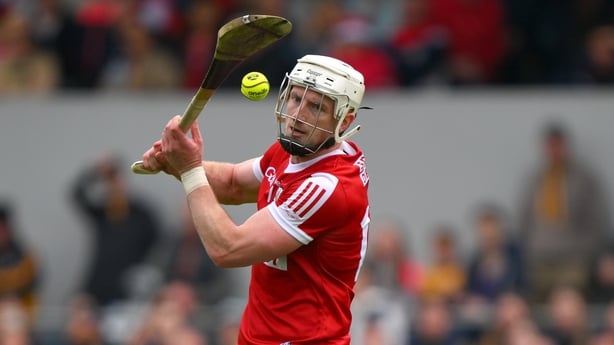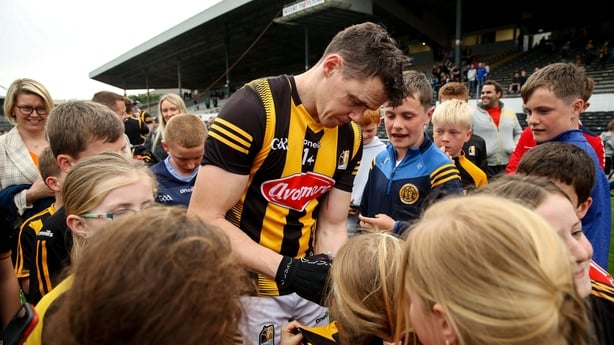Patrick Horgan and TJ Reid are currently in a joust for historical supremacy to precious little fanfare.
On Saturday last, Reid became the first player to hit 600 points in championship hurling. The following day, Horgan became the second, re-taking the lead in the all-time rankings in the process.
Not that many would know about it. There has been a conspicuous lack of buzz around this history-book shootout. The GAA, not terribly careful in their hoarding of stats, appear to be culturally disinclined to make much of a fuss.
If this was America, the play would be stopped each time the record was broken. Both teams would have to stand and applaud the new record holder, perhaps feeling compelled to remove their helmets as a mark of respect.
Both management teams and the two benches would stride onto the pitch to embrace the man himself (Brian Lohan would probably have a head on him at this point, but custom would oblige him to plough on.) Then there would be an impromptu interview with the on-duty sideline reporter, which would be played out over the stadium tannoy.
A few Hall of Famers - Keher, Cregan, English - would appear on the sideline, glistening in their formal wear, ready to greet the hero of the hour.
If it was a really significant record, there'd probably be a pre-arranged flyover, bearing a message like 'Hoggie 24-550'.
Then the game would resume.
This is not the way of things in hurling nation. No, here, the new record breaker is treated to nothing more grand than a malevolent dunt from his marker as he scampers back in position for the quick puckout.
The commentator, if he felt compelled to show off his homework, would announce that as far as he could tell, the ace marksman had broken the championship scoring record. The reporters on the hurling beat might tweet about it. The detail would make its way into a few match reports, provided they had space.
Instead of the Hall of Fame guard of honour, Babs would go on local radio and tell everybody that Jimmy Doyle would have scored twice what the current crop had managed if he hadn't to puck a solid wet boulder around the place his entire career.
This is the ceremonial protocol as it currently exists.
Perhaps the players are grateful there isn't such a fuss. In the States, there is, of course, a much greater worship of the individual and the individuals in question appear more willing to luxuriate in that worship. Certainly, it's difficult to imagine LeBron or Aaron Rodgers or whoever responding to the acclaim by telling the crowd that, 'It's no use now if we don't drive it on.'
American sports media sets great store by numbers, statistics and other very black and white measures of greatness. At least 70% of ESPN sporting discussions seem to consist of lads shouting across a table at one another about who in fact is the GOAT. And if you're not coming to that showdown with an unanswerable list of black and white figures, then Skip Bayless will send you packing with a flea in your ear.
You can't watch five minutes of Premier League action without some commentator reciting statistics at you. Albeit they make it easier for themselves by only counting from 1992. Most goals in a season in the Premier League era. Most assists before Christmas in the Premier League era. Most hat-tricks away from home on a Tuesday with the other team down to 10 men in the Premier League era.
Not terribly diligent in the collating of stats, the GAA have instead outsourced this activity to amateur statisticians and programme hoarders around the country.
Change is coming on that front, with the association announcing last December that it was close to developing a centralised match results and player records archive, with the help of statisticians and archivists like Padraig Ferguson and Leo McGough.
The present Horgan-Reid history book ding-dong isn't even treated with the usual level of hoopla because the record keeps changing hands with monotonous regularity.
Reid goes out on a Saturday and zings over 0-10 or so and sets a new record. Horgan steps into a Munster championship cauldron on Sunday, rattles in a goal and a glut of points to take it back.

Some of the apathy is down to the belief, prevalent among the older demographic, that Reid and Horgan are beneficiaries of an era when scoring in hurling went silly altogether. As late as the mid-noughties, scores of 1-14, 0-17 and 1-16 were sufficient to win All-Ireland finals. Thus they are factoring rampant score inflation into the assessments. The old-timers will bring up their gripes about the ball and the ever-expanding size of the bás.
In 2019, RTE Sport's Michael Glennon asked a number of hurley makers around the country when they last made a legal hurl for a senior player. Sixmilebridge's Sean Torpey pondered the question for a minute and replied "Maybe the early 2000s. Or the late 90s." The answer was roughly similar elsewhere.
Only this week, Central Council have revised the hurling bás size regulations, increasing the maximum from 13cm to 17cm, both in recognition of reality and possibly in the hopes of imposing a new standard which may actually be enforceable (or maybe not). This is a revolutionary line of thinking which may have exciting implications for the steps rule, among others.
Of the top 20 in the hurling championship scoring charts, only five of them played most of their careers in the 20th century - Eddie Keher, Christy Ring, DJ Carey, Nicky Rackard and Jimmy Doyle.
Ring and Keher were almost helped by their extreme longevity. Rackard is high up on the strength of his astonishing goal-scoring numbers - 59 in total across a 17-year career. Even Seamie Callanan is going to fall well short.
Joe Canning, who briefly headed the historic scoring charts after his last championship game in 2021, has the highest individual game average.
Given the rate of inflation on the scoreboard and the regularity with which top spot has changed hands in the past decade, it's fair to wonder how long either Reid or Horgan's record - whichever of them finishes ahead - would survive in the long run.
Unless the GAA move to rein in scoring by tinkering with the sliotar, then it's probable that the Galácticos of 2030s hurling will have the Horgan/Reid tally well in their sights. The next generation of marksmen will also have the benefit of playing their entire career under the round-robin structure.

As for the present battle, who will wind up ahead?
The current state of play is that Horgan sits four points clear on 610 (23-541), with Reid on 606 (30-516).
Having played four less games, Horgan's scoring average is slightly better - albeit it should be acknowledged here that Reid was famously a sub for much of the early part of his career.
The Glen Rovers great is also seven months younger though both - at 35 - are very much perceived to be in the twilight of their inter-county career.
But Reid's numbers are better in this campaign and he enjoys the benefit of operating in Leinster, where he has the advantage of being able to rack up numbers in low-stakes games against the yo-yo sides.
With Kilkenny certain to advance and Cork's fate very definitely in the balance, it is probable that Reid will finish 2023 ahead.
Horgan may have to outlast his Kilkenny rival to top the charts. He may have more incentive to do so as he seeks that elusive Celtic Cross, with a promising Cork generation looming over the horizon.
Watch a hurling double-header, Dublin v Galway and Limerick v Cork, from 1.30pm on Sunday on RTÉ2 and RTÉ Player, follow a live blog on the RTÉ News app or RTÉ.ie/Sport or listen to live radio updates on Sunday Sport on RTÉ Radio 1


